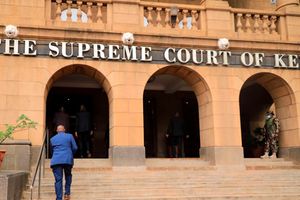
Artificial Intelligence, Internet of things and Machine Learning will blur the line between physical and biological world.
Karl Marx is said to have argued the economic differences between people do not only arise because of economics but also technology. Those that take advantage of advancing technology will lurch ahead and those that do not lag behind.
The world is now under the cusp of Fourth Industrial Revolution. This is technological advancement in "cyber physical systems such as high capacity connectivity." Klaus Schwab, the World Economic Forum founder, defines it as a significant shift in industrial capitalism. Artificial Intelligence, Internet of things and Machine Learning will blur the line between physical and biological world.
This new metaverse will have a profound impact on social, political and economic systems. This new world will move away from the information age and usher "imagination age." Those that possess imagination skills will earn more than those possessing analytical skills.
Data will be the new oil. For example, a politician can know using technology if he or she is popular. A company that intends to establish business can use technology to understand if demand is present for one's goods. Therefore, those that hold this data will make informed decisions and probably obtain value from it. Counties can decide where to put more schools or dispensaries in a more logical sense. Technology will make it easier for wananchi to access county services.
Murang’a County has, however, identified challenges in its journey towards total automation of its services. These challenges form crucial building blocks for a good digitisation agenda. Apart from automation of revenue collection, land systems and county vehicle tracking systems, it is currently endeavouring to automate its 157 health facilities to introduce paperless patient journey and track drugs availability.
The following challenges, though they could arise when automating other services, they have been uncovered as we automate the 157 health facilities.
First, Internet connectivity particularly in rural areas remains a challenge. Fibre remains the cheapest mode of Internet distribution but currently only main urban areas enjoy this service. The next best course is Wifi which has its own challenges, including constrained speed plus cost. Probably more investments need to be done to boost fibre Internet in the entire country.
Second, local area network connectivity within a facility. This is akin to electrical wiring within a building. Often, one will place an Internet gadget aiming to broadcast Internet in the entire facility. On testing, one realises it's reach is thoroughly constrained. One is forced to do more expensive LAN distribution.
Proper mapping and survey is required prior to commencement of the project. Third, the software has to be ‘fit for purpose.’ Software development has to fit certain standards for whatever sector one is automating for uniformity.
For instance, in healthcare, the software has to be aligned to processes of a health facility. For instance, patient registration, triaging, consultation, pharmacy and lab. But some counties could be interested in harvesting certain specific information.
Fourth, hardware component of the journey is capital intensive. The tablets, computers, laptops and their security in respective facilities. Passwords and locking gadgets can remedy the situation.
Fifth, skills set required to support the automation journey is highly specialised. Software engineers who develop the software; network specialists who help in Internet distribution. Counties need to imbue mathematics and sciences competencies to support this echo system.
But doctors, nurses and other medics need to be working in cahoots with these IT experts .Counties need to engage these engineers fulltime to keep the entire echo system running.
Sixth, change management is an important facet of the journey. This is not only on the part of staff who incidentally embrace technology more enthusiastically. But mainly the public who really need to understand initial bottlenecks that might include downtime in the system leading to service disruption.
Connected to this is cyber security and blocking of access to " unproductive sites " like gambling and games. These sites will consume Internet payable by the counties hence one can restrict access. Connected to this is blocking Internet access by devices (for example, phones) other than county devices.
However, a good balance is needed because some sites could appear unproductive but they help. For instance, Google search is good for research.
Finally, and most importantly, efficiency of the system should remain optimal.
The servers that host these systems at times experience downtime. The national government servers hosts counties health systems and whenever there is an outage ,unfortunately it can have devastating effects.
For instance, prior to automation, a surgeon in Muranga referral hospital needed a nurse who would share instantly medical records of a patient as an operation was happening. Upon automation, the nurse went to handle other key duties as the doctor had this information on a screen.
Downtime means a surgeon who does not know the name of a patient in a surgical room. National government should do cloud hosting and simultaneously engage top notch hosting entities to avoid downtime.
However, notwithstanding these challenges, automation of county services in particular healthcare remain the best way forward. At a click of a button, counties will be able to know how many patients sought services in their health facilities and for what diseases; most ( un) available medicine and plan better.
Patients will no longer carry physical hospital records. Patients will get better treatments as medics will retrieve better patients medical history.
Automation of health services lays building blocks for tele- medicine, a future where patients will be treated at the comfort of their houses.
No need for long journeys to the hospital.
- Dr Kang’ata is the Governor of Murang’a County. Email [email protected].







